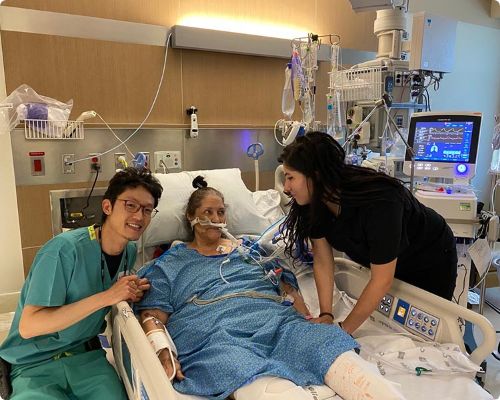SUBSCRIBE TO THE PODCAST
The ICU can be an overwhelming and traumatic experience. As a loved one, you are needed on the ICU team. You play a key role in helping your loved one survive and thrive. This is your guide to knowing how and why to advocate for the latest practices for your loved one.
Episode Transcription
My name is Kali Dayton. I’m an ICU Nurse practitioner on a mission to transform patient care and outcomes through avoiding sedation and optimizing mobility. To put simply, I want to help your loved one to survive and thrive. This may require quick and effective action from you to help your loved one and ICU team change some aspects of their ICU care.
To explain, let me rewind. My first job as a brand new registered nurse was in an ICU. When they interviewed me, they asked, “Would you be willing to walk patients on ventilators?”. I was so inexperienced, I didn’t really understand what that meant, and I passionately replied, “YES!”.
What I didn’t appreciate for years, is that in just about any ICU in the world, every single patient on a ventilator is given deep sedation and put into what we call “a medically, or drug-induced coma”. Now, we will get into the reality and repercussions of this later, just know that this is what is “normal” in the ICU community. Every patient on a ventilator is in a coma. A breathing tube equals the same medications that are given in surgery for a few hours but likely given for days to weeks. This is the current standard of care.
Yet, when I trained in the “Awake and Walking ICU”, that is not what I was taught. The practice there was to allow almost every single patient to wake up after intubation- or, the procedure of placing the breathing tube. We instinctively re-oriented the patient, helped them understand and acclimate to the tube, let them write on a board or text, and addressed their anxiety and/or discomfort as they reported it. Usually hours after intubation, they were sitting up, standing, and more often than not, walking around the unit.
I didn’t understand how unique let alone how IMPORTANT all of this was. It was just “normal” there. After a few years, I left to be a travel nurse and traveled to a different hospital every 3 months or so. Initially, I was completely shocked to find all my patients on ventilators were on sedation IV drips. When I would ask the doctors or other nurses WHY they were on those medications- they would look at me like I was crazy and say, “Because they’re intubated!” – meaning, they are in a coma because they have a breathing tube!
That didn’t make sense to me. I was taking care of the same kind of patients- with the same diagnosis- and often not even as critical or sick as others that I had help walk the halls of my past ICU. Yet when I would propose waking them up and walk them, I was met with shock, horror, disbelief, and belittlement. People started to doubt whether I was a real ICU nurse. I didn’t really understand the big picture of it all, so I shut up and learned to do it “their way”.
Years later, I poured over the research and the big picture of critical care medicine was unveiled to me. I found my calling to try to provide this information to the world. I have dedicated almost 2 years to developing a podcast, webinars, modules, and training program for ICU teams to change their care and transform patient outcomes through avoiding sedation and maximizing mobility. Yet, unfortunately, change is slow, and not fast enough for your loved one that is in the ICU right now.
Listen, you as a loved one, have a right to have the same information. We’re going to get into sedation, delirium, and immobility in the upcoming episodes, but first, for the next few episodes, we’re going to lay a foundation of understanding of the ICU, your role as a loved one, and tools for advocacy. I will likely refer to select episodes in the clinician podcast, so have it handy as a reference for homework. It is called, “Walking Home From the ICU”.
Before we dive deep into this, let me just step back and feel with you. This is hard. This is scary. This is stressful. These are some of the worst times of your life. You could not have prepared for this no matter what has led up to this exact moment. I have worked in critical care medicine for 10 years – this is my dream career. I love the ICU. I love ADULT ICU. I never wanted to work in pediatrics. I can’t tolerate the idea of children being sick and suffering… and a year ago, that’s exactly where I found myself. With my daughter. For a week. Facing a ventilator. Fortunately, it never came to that, but it was touch and go.
I knew the lingo. I knew what was happening and what could transpire when I ran into the ER with her limp body in my arms. I knew the thoughts running through the provider’s minds when they looked at her. I knew they were running to grab a breathing tube and breathing machine. No matter what I knew and despite my years of experience- this time- from the other side of the bed- as a loved one- this was entirely different and completely traumatizing.
Fortunately, My daughter had incredible care in the pediatric ICU and I was well supported. Nonetheless, I found myself in a sense of shock and a little bit lost as to what I could do to help. From palliative care consultations to genetics, pulmonology, intensivists, and neuromuscular doctors- it was just a lot- even for this ICU nurse practitioner.
So, I appreciate in my own version, what you are going through. This is incredibly stressful, scary, painful, and traumatizing. I watch online discussions in Facebook groups with loved ones talking together and trying to make sense of what is going on and what they can do while they feel so useless in the ICU.
I want you to know that you are not useless nor helpless. You are needed on the ICU team. Hang with me. Please keep listening. My goal is to provide simple, clear, powerful, and effective information and tools to help you collaborate with your ICU team to give your loved one the best chance to survive and thrive. You are not alone. You are not to be a quiet observer in this process.
Check out the blog for links to many helpful websites and resources for families. On my website, www.daytonicuconsulting, each episode for both podcasts – “Walking Home From the ICU” for clinicians and “Walking You Through the ICU” for families- are transcribed with all references to research from medical journals that are used in these episodes. You can find this in the blog section.
If you need support beyond this podcast for concerns specific to your loved one’s situation, please schedule a consultation with me at www.daytonicuconsulting.com . Welcome to the ICU team as their newest team member. Buckle up, we’ve got a lot of catching up to do and it’s going to be a ride.
What is it like to work or be a patient in an “Awake and Walking ICU”?
Episodes on the “Awake and Walking ICU”:
Clinician Testimonials:
- https://anchor.fm/walkinghomefromtheicu/episodes/Episode-14-Different-Treatment-Different-Outcomes-eb8k6f
- https://anchor.fm/walkinghomefromtheicu/episodes/Episode-21-What-Weve-Always-Done-Isnt-Always-Right-ebbnnq
- https://anchor.fm/walkinghomefromtheicu/episodes/Episode-23-Registered-Nurses-ebbohk
- https://anchor.fm/walkinghomefromtheicu/episodes/Episode-24-Physical-Therapists-ebdpoi
- https://anchor.fm/walkinghomefromtheicu/episodes/Episode-25-Respiratory-Therapists-ebdq5c
- https://anchor.fm/walkinghomefromtheicu/episodes/Episode-26-Nurse-Practitioners-ebdqkl
- https://anchor.fm/walkinghomefromtheicu/episodes/Episode-27-Physicians-ebdqta
- https://anchor.fm/walkinghomefromtheicu/episodes/Episode-28-Pharmacists-ebdron
- https://anchor.fm/walkinghomefromtheicu/episodes/Episode-29-Occupational-Therapists-ebe4j6
- https://anchor.fm/walkinghomefromtheicu/episodes/Episode-31-Nurse-Manager-ebe6kc
- https://anchor.fm/walkinghomefromtheicu/episodes/Episode-48-QA-eghv2e
- https://anchor.fm/walkinghomefromtheicu/episodes/Episode-47-Change-Practices-to-Change-Lives-eg28en
- https://anchor.fm/walkinghomefromtheicu/episodes/Episode-46-Waking-Up-After-Decades-of-Sedation-eflnjt
- https://anchor.fm/walkinghomefromtheicu/episodes/Episode-45-Physical-Therapy-In-the-ICU-During-COVID19-efa092
- https://anchor.fm/walkinghomefromtheicu/episodes/Episode-40-Cultural-Revolution-ee53ge
- https://anchor.fm/walkinghomefromtheicu/episodes/Episode-39-Ethical-Turmoil-ee0ueq
- https://anchor.fm/walkinghomefromtheicu/episodes/Episode-57-Not-In-Kansas-Anymore-esjiqu
- https://anchor.fm/walkinghomefromtheicu/episodes/Episode-38-THEYRE-AWAKE-edu0oh
- https://anchor.fm/walkinghomefromtheicu/episodes/Episode-55-Walking-Around-the-World-eqq974
- https://anchor.fm/walkinghomefromtheicu/episodes/Episode-49-The-Cost-of-Rot-eglbin
- https://anchor.fm/walkinghomefromtheicu/episodes/Episode-77-Start-Where-You-Are-e141hv8
- https://anchor.fm/walkinghomefromtheicu/episodes/Episode-76-Less-Sedation–Less-Work-e13fr4j
- https://anchor.fm/walkinghomefromtheicu/episodes/Episode-86-Ventilator-Management-in-the-Awake-and-Walking-COVID19-Unit-e187sbi
- https://anchor.fm/walkinghomefromtheicu/episodes/Episode-79-Step-Up-and-Step-Forward-e15caho
- https://anchor.fm/walkinghomefromtheicu/episodes/Episode-93-Updates-From-the-Awake-and-Walking-COVID-ICU-e1bft1b
- https://anchor.fm/walkinghomefromtheicu/episodes/Episode-91-The-Awake-and-Walking-ICU-in-Denmark-e1a93ql
Survivor Testimonials:
- https://anchor.fm/walkinghomefromtheicu/episodes/Episode-15-Walking-Through-Severe-ARDS-eb9kup
- https://anchor.fm/walkinghomefromtheicu/episodes/Episode-17-Walking-On-The-Ventilator-For-17-Days-eba2e0
- https://anchor.fm/walkinghomefromtheicu/episodes/Episode-18-Walking-On-ECMO-Part-1-ebbi64
- https://anchor.fm/walkinghomefromtheicu/episodes/Episode-19-Walking-On-ECMO-Part-2-ebbi7n
- https://anchor.fm/walkinghomefromtheicu/episodes/Episode-20-A-Chance-To-Say-Goodbye-ebbmc2
- https://anchor.fm/walkinghomefromtheicu/episodes/Episode-16-Defending-the-Defenseless-eb9l4n
- https://anchor.fm/walkinghomefromtheicu/episodes/Episode-34Recommendations-From-a-4-Time-Ventilator-Survivor-ecaaen
- https://anchor.fm/walkinghomefromtheicu/episodes/Episode-44-Walking-Home-From-the-ICU-after-COVID19-ef3970
SUBSCRIBE TO THE PODCAST



 I stumbled upon Kali’s podcast midway through my anesthesia critical care fellowship in February 2021. At our institution, I got the impression that patients in the ICU either got better on their own or had a prolonged and complicated course to LTAC or death. In her podcast, Kali explained that LTAC was rarely the outcome for patients in the Awake and Walking ICU in Salt Lake City.
I stumbled upon Kali’s podcast midway through my anesthesia critical care fellowship in February 2021. At our institution, I got the impression that patients in the ICU either got better on their own or had a prolonged and complicated course to LTAC or death. In her podcast, Kali explained that LTAC was rarely the outcome for patients in the Awake and Walking ICU in Salt Lake City.
